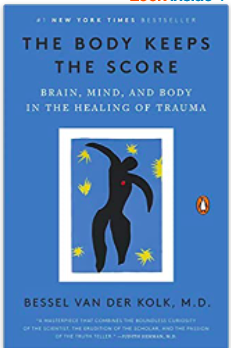The post Sexual Abuse & Emotions and Feelings on #sexabusechat appeared first on PTSD Parent.
]]>Sexual Abuse & Emotions and Feelings
In the process of going through trauma (especially sexual abuse), our survival mechanism is to disconnect the body and the brain. The first things to be shut down are emotions and feelings – sensing, allowing, connecting, identifying, processing, and communicating.
Our emotions are first felt in our bodies, and the survival instinct to disconnect the body from the brain keeps us from processing, releasing, and making meaning from these emotions and feelings. This energy lives in our cells, muscles, and tissues, making our bodies more and more uncomfortable. (For a lot more about this, check out The Body Keeps the Score.)
One of my passions in this trauma and grief recovery work is encouraging and teaching people how to feel safe and secure while reconnecting their bodies and brains. Processing emotions and feelings can feel threatening. It takes gentleness, compassion, and curiosity to begin to open the door to this kind of reconnection.
What is #sexabusechat?
The community #sexabusechat draws survivors of childhood sexual abuse and sexual assault. This chat takes place primarily on Twitter, with weekly spotlights on advocates for recovery from this type of trauma. There is a guest speaker each week, and listeners can join in with a link – no need to be active on Twitter to listen in and ask questions.
My episode was about emotions and feelings and how to deal with them as a survivor of childhood sexual abuse and all of the trauma that goes along with that. Some of the topics covered include why we as sexual abuse survivors have trouble regulating emotions, how to deal with emotional responses and PTSD triggers, and a helpful acronym for regulating emotions. Take a listen below ~
Additional Resources From This Episode
There was a lot to cover, and the questions and collaboration were wonderful. Some of the additional mentions include these articles, which explore the link between sexual abuse and addiction.
Understanding the Link Between Sexual Abuse & Addiction | Tranquil Shores
“A study in the Journal of Traumatic Stress indicated 90 percent of women who became dependent on alcohol were violently abused by a parent or were sexually traumatized as a child.
Additionally, youth with a history of child sexual abuse were 2-3x times more likely to have drug dependence than peers who were not traumatized.
Some studies indicate that drug abuse is more common than alcohol use in adolescents who have been sexually traumatized.”
Sexual Trauma and Addiction: Understanding Child Sexual Abuse and Drug Use – Drug Rehab Options
Speaking of addiction, Seeking Safety Coming Soon
One of my goals is to work with people with PTSD using the Seeking Safety curriculum. I’ve been through a couple of groups using Seeking Safety and really liked what it offered, as well as the group dynamic. This group is for those who have experienced trauma, or have PTSD, or are in substance use recovery, or any or all of the above.
If you’re interested in a future Seeking Safety group, sign up below:
Try Trauma Recovery & Grief Recovery Coaching
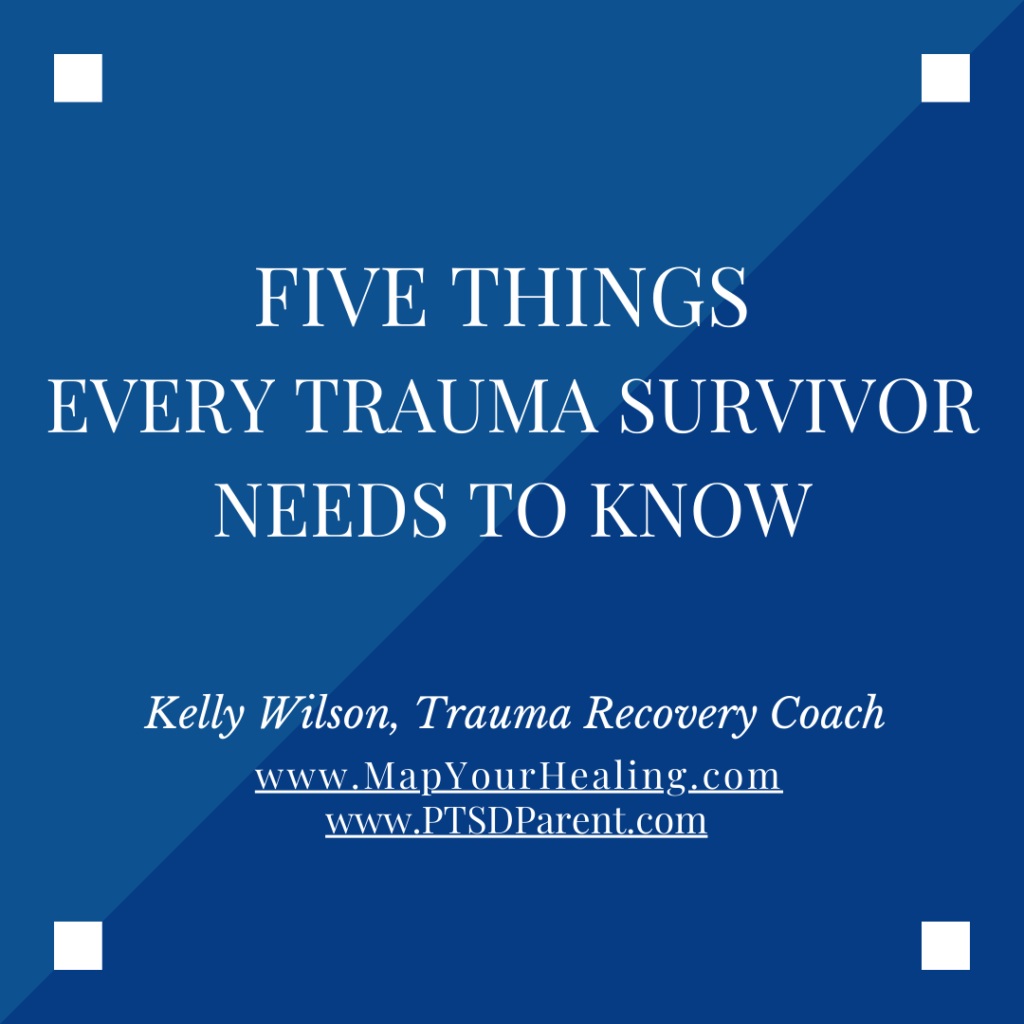
Sign up here to get a free copy of Five Things Every Trauma Survivor Needs to Know
Find out more about Trauma and Grief Recovery Coaching
I offer one-on-one sessions, groups, PTSD Remediation, and classes. Appointments are offered in-person and online.
Try Trauma Recovery and Grief Recovery Coaching for Free! Book an appointment or schedule your FREE 30-minute discovery call to learn more!
The post Sexual Abuse & Emotions and Feelings on #sexabusechat appeared first on PTSD Parent.
]]>The post Making Mother’s Day a Peaceful Holiday appeared first on PTSD Parent.
]]>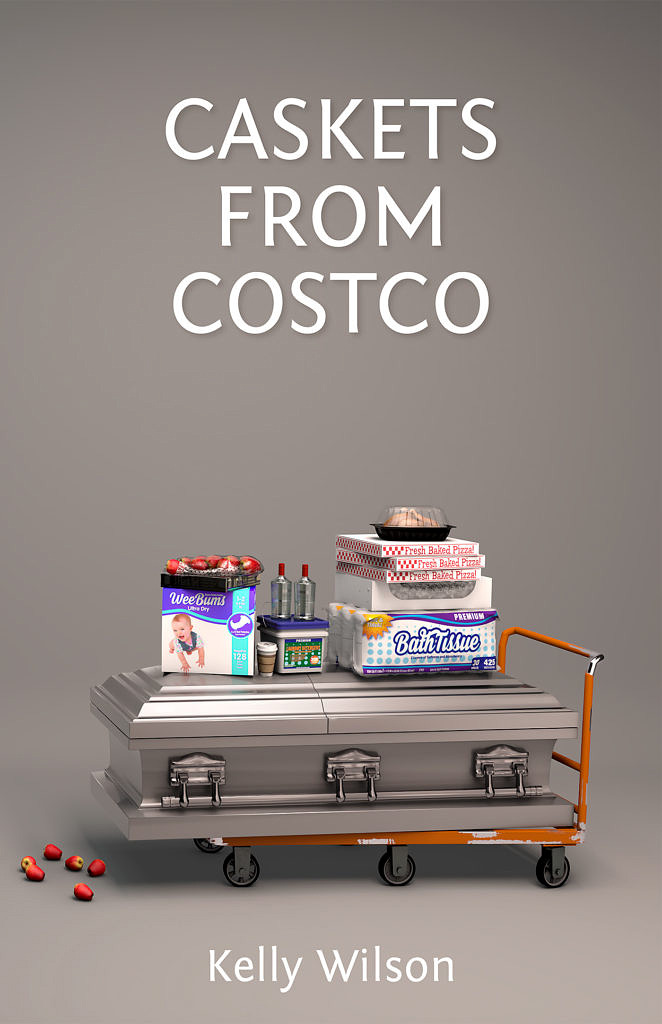
I am estranged from my mother (and other family members) due to past family trauma.
I am a survivor of childhood sexual abuse by my father. When I was 16, I disclosed this to my mother through a series of truly unfortunate events (details can be found in Caskets From Costco). We pursued legal action, and nothing happened – meaning, he was not convicted or trialed or jailed or anything like that.
A few months later, through another series of unfortunate events, he showed up at our home. My mother took him back, over my protests. A few weeks after that, he walked away, got a divorce from my mother, and married somebody else. So, yeah, Mother’s Day can be tough.
There are many reasons that this holiday can cause discomfort and pain. Here are some tips to help manage PTSD around Mother’s Day.
Make a Mother’s Day Plan
One of the ways to manage ourselves and PTSD triggers during Mother’s Day is to make a self-care plan. Here’s an example that might help.
Acknowledge what is difficult about the day. If you wake up and you can tell it’s a tough day, acknowledge that reality. Simple acknowledgement goes a long way toward peace.
Decide what you will not do. Many times, deciding what you will not do is far easier than figuring out what you like or want to do. For instance, I will NOT be doing the dishes that day.
Schedule everything, including rest, for that day. Figure out what you’d like to eat, do, and even wear (pajamas, anyone?)
Ask for help. Manage expectations, including your own. If you want or need something, ask a safe person in your life to help you out.
Focus on what you love. I don’t mean toxic positivity, where you pretend that you’re happy and “everything’s fine.”. I mean finding one tiny (or big) thing during a moment that you love. Maybe it’s the taste of chocolate on your tongue or the feel of your favorite sweater.
Making a plan is one of the proactive ways to manage triggers on a day of emotional landmines. This can help you stay present, which can be really difficult to do with PTSD.
Seek Peace with Grounding Techniques
One of the toughest things to do when having a trigger is becoming aware of it either right before it happens or when it’s happening. Awareness of triggers can help build in pauses – maybe the tiniest of pauses – where we are reminded to ground ourselves.
Here is a video I made of a breathing exercise that I like to do when I feel agitated.
Other easy grounding exercises include the 5-4-3-2-1 and the what I call “the color picker.” In the 5-4-3-2-1, count 5 things you see, 4 things you hear, 3 things you can touch, 2 things you can smell, and one thing you can taste. With “the color picker,” look around and count how many things around you are red (or another color, if you prefer).
In a trigger emergency, I’ll share a secret with you that one of my therapists taught me. If you are agitated and feeling out of control, stand up and spin or twirl 10 times in a row. This taps into the where the vagus nerve hits the inner ear, and gives us a reset.
Be Gentle With Yourself
No matter what, let’s be gentle with ourselves.
We deserve peace, especially on Mother’s Day.
About Trauma Recovery & Grief Recovery Coaching
Kelly Wilson of PTSD Parent is a Trauma Recovery Coach and Grief Recovery Specialist. In 2020, she worked with a therapist and completed PTSD Remediation, a technique that uses the vagus nerve to eradicate PTSD triggers.
Sign up here to get a free copy of Five Things Every Trauma Survivor Needs to Know
Find out more about Trauma and Grief Recovery Coaching
I offer one-on-one sessions, groups, PTSD Remediation, and classes. Appointments are offered in-person and online.
Try Trauma Recovery and Grief Recovery Coaching for Free! Book an appointment or schedule your FREE 30-minute discovery call to learn more!
The post Making Mother’s Day a Peaceful Holiday appeared first on PTSD Parent.
]]>The post PTSD and Trauma Recovery Coaching appeared first on PTSD Parent.
]]>So What is a Trauma Recovery Coach?
I get this question a lot, and with good reason. Becoming a Trauma Recovery Coach is on the cutting edge of mental health, which means that this is an innovative way to provide mental health care. Also, it means that nobody knows what I do, exactly.
In short, I help trauma survivors build a life they have always deserved and wanted. But how?
Here are several questions that help explain my role as a Trauma Recovery Coach. Is there a question I didn’t answer? Please add it in the comments!
Is This Therapy?
Therapy is a good place to start when explaining what a Trauma Recovery Coach does with clients. Therapists and Trauma Recovery Coaches meet with clients and work on specific issues over time. Therapists and Trauma Recovery Coaches know a ton about trauma, mental illnesses, grief and loss, and more. We all care about our clients reaching healing milestones and creating the happiness and life they have always deserved and wanted.
So what are the differences? Therapists do three things that Trauma Recovery Coaches do not do: diagnose mental illness, prescribe or suggest different medications, and create specific treatment plans. I know a lot about mental illnesses but I do not diagnose. This is out of my scope of competence. It takes several years to learn how to diagnose, and sometimes professionals still get it wrong before they get it right. I also do not suggest or prescribe medication, which is the job of a medical doctor or psychiatrist.
Last, I don’t create treatment plans. Individuals come to me and we work together on the issues and challenges that are present. We live in the now, and we lead from behind, providing voice and choice for our clients.
Is This Just Life Coaching?
I am confident about providing life coaching if that’s what clients are looking for. One aspect of life coaching in that I support my clients and what they want to do in their lives. However, I provide so much more as a Trauma Recovery Coach.
The primary difference is that Trauma Recovery Coaches are trauma-informed. We are trained to understand and address the unique challenges and mindsets that trauma survivors experience. As a trauma survivor myself, I have a unique perspective and set of skills to address trauma-related issues as we meet over time.
Do Trauma Recovery Coaches Work with PTSD?
Absolutely! Trauma Recovery Coaches have all kinds of specialties. My specific specialty is PTSD Remediation. Diagnosed with Post Traumatic Stress Disorder in 2006, I lived with PTSD for most of my life, until PTSD Remediation eradicated the symptoms. I continue to learn all I can about PTSD and the emotional, mental, and physiological fallout from childhood sexual abuse. That is my background and I have passion and purpose to help others with these issues.
Are Trauma Recovery Coaches Certified?
Trauma Recovery Coaches need to be certified. As of now (fall 2021), I am waiting on certification from the International Association of Trauma Recovery Coaching. I just need my portfolio to be approved! But I have had the necessary education for certification. Plus I will continue to studying with them – and other notable organizations – to gain more knowledge, wisdom, and experience.
What if I’m Not a Trauma Survivor?
Everyone struggles with different things. I welcome people of all kinds, trauma or not. We are in this together.
How Do I Find Out More About Trauma Recovery Coaching?
I offer a free 30-minute discovery call so that you can find out what you need to know, if we have a connection, and if you want to move forward on this journey of hope and healing. Another way is to sign up here to keep in touch and get to know me a little better!
Do you have more questions? Put them in the comments for more answers!
The post PTSD and Trauma Recovery Coaching appeared first on PTSD Parent.
]]>The post PTSD and the July 4th Holiday appeared first on PTSD Parent.
]]>
The good news is that there are ways we can protect ourselves during the July 4th holiday from environmental triggers that can eat up an hour or a day or more of our lives. Here are five ways to lessen the impact of the noisy July 4th celebrations. Enjoy the acronym, where if you put the first letters of each one together, it makes the word SPARK!
I know, I’m sorry, I can’t help it. Hopefully, though, one or more of these suggestions will resonate and be useful during the July 4th weekend.
Stay Home…or Don’t
Staying home is one of the safest ways to guard against PTSD environmental triggers during this holiday. But maybe you’re not into isolating or staying home.
The important point is that you have the choice and you have your own voice. You get to decide how, where, and when you will – or will not – celebrate our nation’s birthday over the weekend. You get to decide if you will stay for the fireworks or if you will stay home. Either way, you remain in control, and that in itself will help cut down triggers.
Plan Ahead
Planning ahead also helps to avoid unexpected triggers, even if your plan is to not have a plan. If structure helps, create a schedule of the activities for the weekend and especially for July 4th. Maybe there’s a fun parade in town, or maybe the crowds would be too much. Perhaps some time relaxing by a nearby river or lake would be welcome, or inviting people over for a barbecue. Maybe you would rather take advantage of the holiday with some typical weekend activities and a nap. Making a plan will help soothe your nervous system and make it easier to cope.
Ask for Help
If you’re spending time with others during the July 4th holiday, setting some preventative boundaries can help avoid potential triggers. Decide what you want to do on that day. For example, do you want to go to any barbecues? The town’s parade? The fireworks?
If you do decide to participate in any of these activities, consider that you don’t have to stay the whole time. You always have a choice. And you don’t have to do any of this alone. Go to these events with trusted friends and family members who are aware of your triggers and what you might need. When you feel a trigger coming on, you’ll be able to ask for what you need, including space and time for quiet or to simply get going.
Rest Beforehand
Let’s face it, these events and the possible triggers are exhausting. They are also fun and exciting, but they require some planning on our end to make things as peaceful as possible during this holiday. Be ready to deal with triggers by resting up beforehand so that you can make the most of the time out with friends and family at these fun activities. And do not forget to rest afterward to be able to enjoy the demands of everyday life.
Know Your Self-Soothing Skills
Escaping for a couple of moments to self-soothe is an important way to be able to have fun and practice self-care. This could look like escaping the heat by finding a piece of cool shade and spending some time alone. Breathing techniques, grounding exercises, and meditation are also helpful for self-soothing anywhere and at any time. I’ve been known to do a short meditation in a friend’s bathroom so that I practice self-soothing and avoid potential triggers.
There are many ways to help ensure that this fourth of July weekend will be a celebration worth remembering. And fortunately, the choices are yours to make regarding how you enjoy it!
The post PTSD and the July 4th Holiday appeared first on PTSD Parent.
]]>The post Can You Make Fun of PTSD? Exciting New Class Says Yes! appeared first on PTSD Parent.
]]>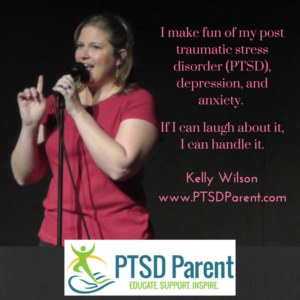 Can you really make fun of PTSD? It seems impossible, especially the morning after a terrifying nightmare or the feeling of panic when a trigger hits. But I’m here to tell you, it is totally possible to make fun of PTSD.
Can you really make fun of PTSD? It seems impossible, especially the morning after a terrifying nightmare or the feeling of panic when a trigger hits. But I’m here to tell you, it is totally possible to make fun of PTSD.
And now I’m teaching people how to do that by learning how to write and perform stand up comedy.
Mental Health at the Mic to Make Fun of PTSD
I have two passions in my vocational life, and I am relieved that they are related: PTSD and comedy. With my Partner in PTSD (Chris), I co-founded the PTSD Parent Podcast and Facebook Live videos (now found on Youtube), which is funny but also talks about serious PTSD stuff. With my mental health advocate friend Dave, I co-founded Mental Health at the Mic, which is also funny and also talks about serious PTSD and mental health stuff.
Mental Health at the Mic is a program that teaches people with mental health challenges – like PTSD – how to write and perform stand up comedy. There are many advantages to using comedy to deal with PTSD – I know personally, because I went through the comedy class when it was called something else. Sure, it was scary – but it was the good kind of fear. It felt like getting my power back.
[Tweet “There are many advantages to using comedy to deal with PTSD – I know personally, because I’ve done it.”]
So How Do You Make Fun of PTSD?
The answer to this question is the same as for, “How do two porcupines make love?” The answer: very carefully.
The old therapy metaphor of peeling the onion – peeling back the layers – to get to the sources of trauma and heal them up works here too. I’ve been doing comedy for almost 10 years (intentionally), and I would still say about 25 percent of my jokes are about PTSD.
This is because – like therapy – we don’t grab anyone by the shoulders and shake them and yell, “Talk about the worst mental illness stuff in your life!” No way! First, you learn how to craft jokes about the stuff that is most urgent and observed in your life. Then maybe go a little deeper.
The great part is, you have all the control.
Comedy Class Details
 If you are in Portland – even if you’re not – I would love for you to spend time in my comedy class with Mental Health at the Mic. (If you’re outside of Portland and interested in bringing in a weekend class, contact me here). The great news is that a comedy class is starting soon! Classes are capped at 8 to 10 students to ensure a safe and comfortable environment and plenty of support. And laughter.
If you are in Portland – even if you’re not – I would love for you to spend time in my comedy class with Mental Health at the Mic. (If you’re outside of Portland and interested in bringing in a weekend class, contact me here). The great news is that a comedy class is starting soon! Classes are capped at 8 to 10 students to ensure a safe and comfortable environment and plenty of support. And laughter.
When We Meet: Tuesday evenings from 6 to 8 p.m. Eight weeks of classes start July 31st! Celebration show with invited family and friends after the last night of class.
Where We Meet: The class will meet in SE Portland. Students will be sent the address before the first class.
Cost: $200 You can pay a $50 or $100 deposit now and the rest when class begins.
Sign Up for the Comedy Class Here!
Still have questions? Go here to learn more about our classes or contact us for more information!
The post Can You Make Fun of PTSD? Exciting New Class Says Yes! appeared first on PTSD Parent.
]]>The post PTSD Parent on Video: It’s as Funny as You Hope appeared first on PTSD Parent.
]]> Many Friday mornings, I head over to my Partner in PTSD’s (Chris) house to record episodes of the PTSD Parent podcast. Oh yeah, the first season of the PTSD Parent Podcast is now available, by the way!
Many Friday mornings, I head over to my Partner in PTSD’s (Chris) house to record episodes of the PTSD Parent podcast. Oh yeah, the first season of the PTSD Parent Podcast is now available, by the way!
We meet when it is so early. This means that it’s 10 am on a Friday. I KNOW, I’M SUCH A CREAMPUFF WHEN IT COMES TO MORNINGS. But sometimes I walk to his house and it’s a half hour each way (uphill, of course, both ways) so I need to factor in my health and stuff. And time to drink my coffee before that. So there’s a lot going on, basically.
Surprise! Ready, Camera, Action!
I say all this because I generally don’t shower on Friday mornings before we meet. I mean, we’re sitting in front of microphones, not in front of a camera.
Usually.
The last time I went over, he surprised me with a camera set up in his kitchen, which is basically where we record our shows. As I got out of my car in front of his house, Chris opened his kitchen window and yelled, “That is quite the patriotic outfit today!”
I can’t help it that I look SO GOOD in camo. It just goes with my skin tone, seriously. In the video below, you can see how much fun we had razzing on my most professional and amazing outfit. Right before we went live, I was singing Proud To Be An American by Lee Greenwood. I’m an Army brat, I know every word.
Well, I rolled with it. Chris generally has great ideas when it comes to our new show, and the live video (included below) introducing the podcast was amazing, showered or not.
How to Get More Episodes and Videos
Now that we’ve recorded video, we are sure to do more. I mean, it was too much fun. We’ll be talking about Post Traumatic Stress Disorder in our lives and families, including symptoms, treatments, research, rumors, and stories from us and from invited guests.
We’re excited for you to be involved. Here’s how you can stay up to date on the latest:
- Subscribe to PTSD Parent to get an alert when the latest video is available
- Like the PTSD Parent Facebook page to get notified of the latest news an videos
- Subscribe to the PTSD Parent Youtube channel
Here is the intro video to the PTSD Parent Podcast
This was really fun to record, unshowered and in a weird outfit or not. This episode introducing the PTSD Parent Podcast is just a really good example of the tone of the show, our chemistry, our sense of humor, and what it’s like to have PTSD from a male and female prospective. Enjoy!
The post PTSD Parent on Video: It’s as Funny as You Hope appeared first on PTSD Parent.
]]>The post PTSD Parent Podcast: What You Need to Know appeared first on PTSD Parent.
]]>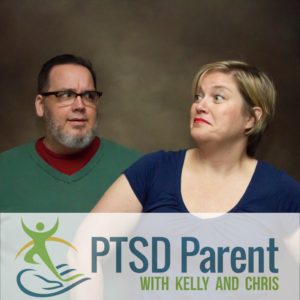 We are so excited and nervous and twitterpated to launch the PTSD Parent Podcast! Chris and I have been working for more than a year on this project – off and on in the midst of life’s challenges, as I’m sure you understand – and have put together our first season, available below.
We are so excited and nervous and twitterpated to launch the PTSD Parent Podcast! Chris and I have been working for more than a year on this project – off and on in the midst of life’s challenges, as I’m sure you understand – and have put together our first season, available below.
The Dream I Didn’t Know I Had
There’s the popular saying about how life happens to you while you’re making other plans, you know? That’s pretty much how my life has been over the last ten years or so.
I had no long-awaited dream involving PTSD Parent, to be completely honest. I had been working through some issues and digging into PTSD recovery, and one morning I woke up and thought, “I can’t be the only parent out there with PTSD. I want to make something for us, a community, a place for inspiration and support.” And the PTSD Parent website was born.
During that process, I applied for a contest that centered around podcasting. I didn’t know anything about it, so I asked Chris. He had recently been diagnosed with PTSD and had helped with PTSD Parent, and he said, “I know a lot about podcasting, let’s enter this contest!”
So we did. We didn’t win. Then he said, “I still want to do this podcast project.” And the PTSD Parent Podcast was born.
Why Listen to This Podcast?
There’s a lot of stuff to read and listen to day in and day out, I get it. But I like this project, and I think it’s worth a listen. And I’ll tell you why:
- The episodes are about 30 minutes long, so not too long and not too short
- We talk about PTSD from a male and female perspective, digging into a variety of issues
- We are funny, so it’s not dry and trudgery (yeah, I made that word up)
- It’s educational in spite of itself, so good for family members and friends of people with PTSD
- There’s a lot of room to grow, and we look forward to having guests in upcoming seasons
We have had fun recording so far, and I think you can tell when you listen.
Where Can We Listen to the PTSD Parent Podcast?
We have a dedicated page to the PTSD Parent Podcast that you can bookmark – it will be updated with new seasons as they become available. Oh, and look! Here are episode right here:
More Places to Listen
We’re working on getting the podcast in as many places as we can so that people can listen anytime they want. Here are links to other places where you can currently find and listen to the PTSD Parent Podcast!
- iTunes
- Libsyn Feed – http://ptsdparent.libsyn.com/rss
- Libsyn PTSD Parent Podcast Page
- Spotify – Still waiting for it to be uploaded, it takes a couple of weeks
The post PTSD Parent Podcast: What You Need to Know appeared first on PTSD Parent.
]]>The post When is PTSD Escapism a Bad Thing? appeared first on PTSD Parent.
]]>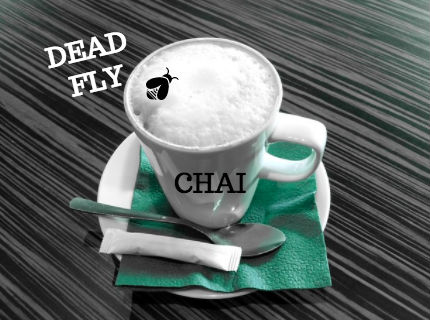
As a young 24-year-old, I spent two and half weeks in Kenya with undiagnosed Post Traumatic Stress Disorder. Spoiler alert: I totally triggered out about halfway through, with no understanding or explanation of what was going on in my brain.
It was during that trip that I heard a phrase from one of the other church group members on our team. We stood in a patchy field under the dappling shadows of one of many types of unfamiliar trees in the countryside outside of Nairobi. Goats and cows grazed nearby.
We held small cups of chai. I call it Barnyard Chai, because if the cup is held under an udder *and* you pick hay out of your cup to take a drink, then it’s from a barnyard.
A fly flew into my new friend’s cup of Barnyard Chai, landed, and died. Legs straight and wings limp, the black raisin-like body floated on the surface of the beige liquid.
She sighed and said, “This is not me. I am not here.” And she reached in and flicked the fly out of her cup, taking a swig.
PTSD Escapism: “This is not me, I am not here”
That phrase was magic. First, I cracked up, of course, watching the dead fly arc through the air, landing in the dirt. Genius, I thought.
 I hung on to that phrase and used it through years of turmoil and trauma. A few years later when my first child was born in the midst of a rare pregnancy disease and we both almost died. A couple of years after that, when my second child was born after I spent a month in the hospital on mandatory bedrest. A year after that, when I broke after a cherished family member died. Through the years of my children’s infancy and toddlerhood, through nights and weekends alone when my husband was working his demanding job, through job changes and layoffs, when friendships died and when I staved off the dark cloud of hopelessness that threatened to engulf me.
I hung on to that phrase and used it through years of turmoil and trauma. A few years later when my first child was born in the midst of a rare pregnancy disease and we both almost died. A couple of years after that, when my second child was born after I spent a month in the hospital on mandatory bedrest. A year after that, when I broke after a cherished family member died. Through the years of my children’s infancy and toddlerhood, through nights and weekends alone when my husband was working his demanding job, through job changes and layoffs, when friendships died and when I staved off the dark cloud of hopelessness that threatened to engulf me.
Now my children are 15 and 12 years old. My marriage is being broken down and built back up. And I’m thinking that this PTSD escapism and daydreaming and fantasy world isn’t the best coping skill anymore.
From Dissociation to Escapism
At this point, I feel like I need to remind everyone that I am not a therapist or medical professional. I am a person who was diagnosed with C-PTSD in 2006 and have been living out my healing and recovery ever since. If you have additional questions about PTSD, dissociation, and dissociative identity disorder, please contact a medical professional.
 Dissociation is that emotional numbing that we feel, the sensation of being outside of ourselves while the trauma was happening and when we have nightmares and flashbacks. I personally consider dissociation involuntary, as this is what my brain did when my sexual abuse happened. My brain protected me through unplugging me from the trauma as it took place over the years.
Dissociation is that emotional numbing that we feel, the sensation of being outside of ourselves while the trauma was happening and when we have nightmares and flashbacks. I personally consider dissociation involuntary, as this is what my brain did when my sexual abuse happened. My brain protected me through unplugging me from the trauma as it took place over the years.
I experience dissociation when I have PTSD triggers, resulting in both intense emotions and my perceived inability and difficulty handling these emotions. Other symptoms can include unexpected mood swings, feeling separate from yourself and others, and trouble concentrating or with memory.
These sensations are familiar to me now, part of the trigger process, and they eventually fade. Escapism, though – I think this has become a problem for me.
The Habit of Escapism
Escapism for me is such a strong habit that it almost seems involuntary. A compulsion. In my research, this is my favorite description of what escapism has become for me:
Escapism is a way of attempting to make negative feelings dissipate, without working through the necessary steps in order to come to relief through mental resolution. It’s a false economy, a quick fix, a crutch, a placebo. Sadly, like all addictions, it will only reinforce your feelings of anxiety further, whilst you seek out new ways to cope. And exactly like all addictions, such coping strategies will begin to unravel, break down and ultimately fail.
Every day, many times throughout the day, I live in this fantasy world that keeps me insulated from real life. The result is feeling increasingly disconnected and alone.
I was recently put on a strict diet by my doctor, which seems unrelated, but it is not. I have serious health issues that require this strict diet, or I will need to go on medication as my health inevitably gets worse. I’m 43 years old. I’m not ready to give up. At the same time, I am fighting against a compulsion to eat, another addiction to sugar and comfort that grew out of a traumatic childhood.
And like my doctor gave me a wake up call with eating and my health, my brain’s escapism habit began to leak into my real life. Stealing it. This is tough and even embarrassing for me to admit, but there it is.
Eating. Fantasy life. Porn. TV and movies. Social media. Alcohol and drug addiction. These are all forms of escapism.
Escaping the PTSD Escapism
 I wish I had the unequivocal answer for how to escape the habit – the compulsion – the perceived need of escapism. The thing about escapism is that it is a choice. I – we – have control over our thoughts, regardless of what we believe. We can choose to be present, to practice be-ing in the midst of the pain and emptiness and fear of the dark cloud.
I wish I had the unequivocal answer for how to escape the habit – the compulsion – the perceived need of escapism. The thing about escapism is that it is a choice. I – we – have control over our thoughts, regardless of what we believe. We can choose to be present, to practice be-ing in the midst of the pain and emptiness and fear of the dark cloud.
When I have practiced mindfulness – the settling and breathing and looking my emotions and PTSD escapism right in the face – I have encountered the person I really am. Those pieces of me that were shattered and stolen. Those jagged shards that were not destroyed.
And if I wasn’t destroyed by all that, I’m certainly not going to be destroyed by simply working to heal.
The post When is PTSD Escapism a Bad Thing? appeared first on PTSD Parent.
]]>The post Mark Your Calendar to Enjoy Grit and Grace appeared first on PTSD Parent.
]]>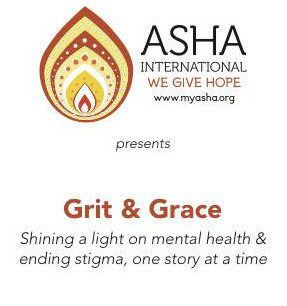 Telling Your Story is One of the Most Powerful Ways to Experience Healing
Telling Your Story is One of the Most Powerful Ways to Experience Healing
I am honored and excited to be a speaker in Grit & Grace, a program put on by ASHA International in the middle of May. This organization has recently developed a speakers bureau – of which I am a part – and the Grit & Grace show is our launch!
While it’s pretty common knowledge that I am a comedian and an author, it’s less well-known that I am also a speaker and storyteller. Like, of a serious kind…that said, I usually can’t resist throwing in a couple of jokes. And by “can’t resist,” I mean that I literally cannot help myself.
If you’re in the Portland metro area, I would love to have you join us for an evening of storytelling by myself and some of my favorite people in the world. Badasses, all of them, telling stories about hope and healing.
Details of the Grit & Grace Program
Admission is free to the public! Please RSVP by emailing gayathri@myasha.org.
When: Thursday, May 17th at 7:00 pm
Where: Intel Hawthorne Farm Auditorium, 5200 NE Elam Young Parkway in Hillsboro
Doors open at 6:30!
Here’s a handy photo flyer to help spread the word!
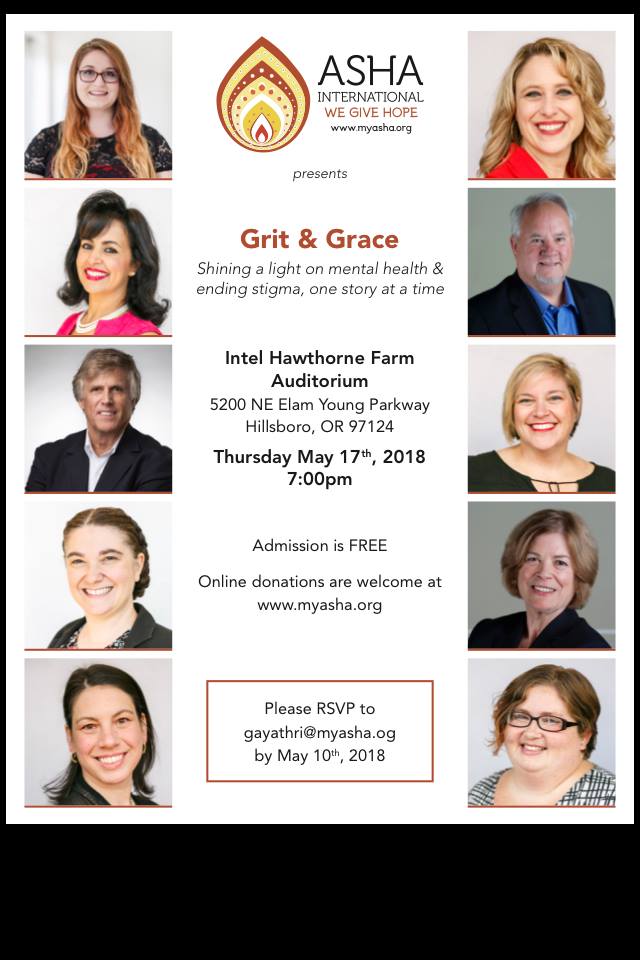
Please Join Us!
The post Mark Your Calendar to Enjoy Grit and Grace appeared first on PTSD Parent.
]]>The post How to Not Have a PTSD Crap Attack During Vacation appeared first on PTSD Parent.
]]>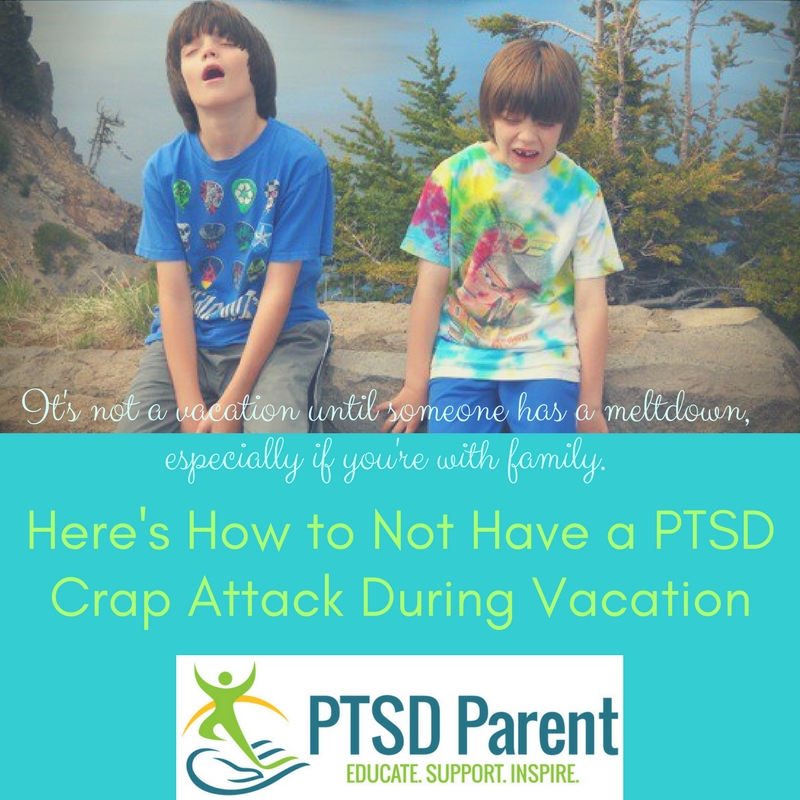
It’s not a vacation until someone has a meltdown, especially if you’re with family. This can be even more of a certainty for those of us with Post Traumatic Stress Disorder.
Lately, I like to refer to my PTSD trigger events as “crap attacks.” First, it makes me laugh. Second, I got it from the TV show Bob’s Burgers, which I binged on during the last year and it is now one of my favorites. I believe the line was spoken by Tina – a teenager – who said, “Geez, Mom and Dad, don’t have a crap attack.” Since I have teenagers, I busted a gut so hard my kids now randomly yell out, “Crap attack!”
My PTSD “crap attacks” can show up even on the most relaxing or fun vacation. Here are some ways that we can take care of ourselves to avoid PTSD triggers during this down time.
[Tweet “Here are some ways that we can take care of ourselves to avoid PTSD triggers during vacations.”]
Manage Expectations of the Vacation
Some vacations do not feel like my idea of a “vacation.” I move at a slower pace than most people. While I enjoy and appreciate adventure, I’m also up for hours in the sun by the pool, dozing and reading. Others in my family – with whom I love to spend time – do not appreciate all of this down time; they like to stay on the move.
For example, when we go to Disneyland with the high school band, I know that I’m not going to have hours by the pool. I know that it will be an exciting and busy series of days, which I will enjoy, but can also make me cranky. I know that the crowds and music and heat will get to me after awhile, and I’ll probably hide somewhere – even in the nearest bathroom. Not my ideal, but managing my expectations for the vacation ahead can help me keep my emotions in check.
I don’t need to plan out every day of my vacations, but I do like to be prepared before I get there. I check out the weather, the hotel, and read up on any of the places we plan to visit. This helps me manage my expectations for the days ahead.
Bring Comforting Stuff
 Hotels can feel sterile to me, even when they’re nice. I don’t know about you, but I can never have enough blankets and pillows. I always pack a thin but comfy and familiar blanket with me, along with my favorite pjs, snacks, books (on my Kindle to make packing easier), and even a couple of movies or shows I can stream.
Hotels can feel sterile to me, even when they’re nice. I don’t know about you, but I can never have enough blankets and pillows. I always pack a thin but comfy and familiar blanket with me, along with my favorite pjs, snacks, books (on my Kindle to make packing easier), and even a couple of movies or shows I can stream.
Sometimes new surroundings can be overwhelming, and coming back to our familiar and favorite things can be very comforting. When I feel extra tired and my defenses are down, I can take a time out with a good book or one of my favorite shows, do some meditation, eat a filling snack, and be ready to head out again.
Do the Boring Stuff
It’s really tempting to have the “Hey, It’s Vacation!” mindset about everything, this may not be the best choice. At least, it’s not sustainable for me. Sure, I can eat a bacon burger and drink a couple of beers and miss my meds for a day and stay up until 2 a.m., but I will pay the consequences.
That’s the hard truth that I need to remember. I make choices and there are consequences. When I don’t do the typical self-care routines that keep me sane, my defenses can fail and PTSD crap attacks are more likely to occur.
On vacation, I try to do as many routine things as possible. If I don’t go to bed at the same time I usually do at home, that’s cool, but I need to try and get eight to ten hours of sleep. I eat regularly throughout the day – more often if we’re walking all day long, like at an amusement park. I pack my meds where I can see them, making them easy to find and take each day. While it’s tempting to skip out on this boring stuff, it can help reduce the chances of a PTSD trigger event.
Take a Time Out
 Since I get overwhelmed in my own home, it’s reasonable to expect that I may be overwhelmed at some point while on vacation. Regardless of where I’m vacationing, I plan one evening that I call, “Introvert Night!”
Since I get overwhelmed in my own home, it’s reasonable to expect that I may be overwhelmed at some point while on vacation. Regardless of where I’m vacationing, I plan one evening that I call, “Introvert Night!”
Instead of hanging out with everyone else, I stay in my room and enjoy the quiet. Taking advantage of the clean bathtub, I take a soothing bath. I enjoy room service, splurging a little on dinner. I watch a movie or two and read. If there are other introverts that I’m traveling with, I invite them into my sanctuary…or I don’t. It just depends on what I need.
Vacations offer us a chance to manage our PTSD so that we won’t have any pesky crap attacks while we’re trying to relax. Take some time to plan what you might need so that you can make the most out of your vacation.
The post How to Not Have a PTSD Crap Attack During Vacation appeared first on PTSD Parent.
]]>